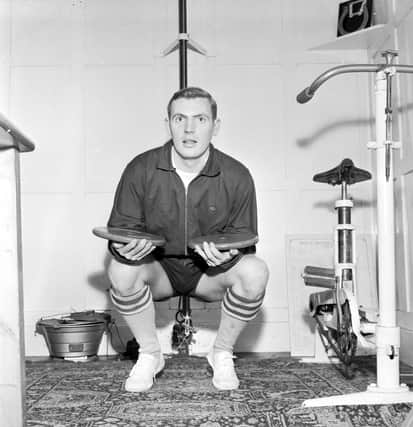Obituary: Jim Townsend, Scottish footballer


Jim Townsend, who has died aged 75, was a well-known Scottish footballer who enjoyed a successful career in the 1960s and ‘70s, playing more than 400 games for St Johnstone, Middlesbrough, Hearts and Morton before finishing his career in Canada, where he settled permanently.
A talented and forceful attacking midfielder, he was unfortunate that his early promise did not lead to a full cap, partly because of injuries and partly because of stiff competition then for places in the national team.
Advertisement
Hide AdAdvertisement
Hide AdWith players of the calibre of Eddie Gray, Jim Baxter, Billy Bremner and others around, making the breakthrough was very difficult. He was capped for the Scottish Youth side and was twice travelling reserve for the national under-23 team.
The closest he came to a full cap was as member of the Scotland squad which undertook a “World Tour” in 1967, during which he played alongside former St Johnstone teammate Alex Ferguson.
Unfortunately, caps were not awarded because of the considered standard of the opposition, although the SFA did recently award one belatedly to another player.
James Clabby Townsend was born in Greenock, to Tony and Catherine nee Clabby, the second of four children.
Along with older brother Bryan and younger sisters Susan and Maureen, they were brought up in the West Station area of the town where his father worked as a marine engineer. He was originally from Croydon but during wartime was working in Greenock, where he met his future wife, then employed in a local munitions factory.
Jim initially attended St Mary’s primary school before going on to St Columba’s High School, where he captained a successful football team and was sports champion.
At the same time he turned out for Woodhall Boys Club and later for Port Glasgow Rovers.
While playing for Rovers he was spotted by chance by Bobby Brown, then St Johnstone manager and future Scotland boss, who secured his signature for £80 and two new balls for the club, fending off interest from Celtic and the two Manchester clubs.
Advertisement
Hide AdAdvertisement
Hide AdHe made his debut for the Perth side on April 7 1962 aged 17 against Partick Thistle at Muirton Park in a 1-0 victory, thanks to an Alex Ferguson goal.
Townsend’s contribution to the team came too late to save them from relegation to the old 2nd Division but he was key to their winning promotion the following season when, still only 17, he also played in a League Cup semi-final against eventual winners Hearts.
Keen to try his luck down south he secured a transfer in early 1964 to Middlesbrough in the old 2nd Division for £27,500, a record fee for the Saints, which prompted the headline, “Townsend lights up Muirton”, a reference to the installation of floodlights facilitated by the fee.
Although a regular first team player at Middlesbrough, the club’s fortunes dipped after manager Raich Carter was sacked and Townsend was keen to return north, rejoining St Johnstone in 1966 for £7,500.
Within a year he was sold to Hearts for £20,000, and in the circumstances it was hardly surprising that Bobby Brown thought this his best-ever piece of transfer business.
When he signed for Hearts, chairman Bill Lindsay declared: “This is the start of the club’s climb back to football fame,” an overambitious and largely unfulfilled prophecy, although Townsend was an important player for the club.
By May 1967 he was off on Scotland’s “World Tour” under Bobby Brown, during which he played in eight of the nine games in Israel, Hong Kong, Australia, New Zealand and Canada, all won by the Scots.
Townsend was rated one of the successes of the tour, with a highlight being his 30-yard goal against Australia in Adelaide in front of 20,000 fans, the Aussies then coached by future Celtic manager Jo Venglos.
Advertisement
Hide AdAdvertisement
Hide AdDuring his five years in Edinburgh he was significantly hampered by a series of injuries, including a broken ankle, a slipped disc, and dislocated shoulder, but still played an important role in the team as link man between midfield and attack, helping the Tynecastle outfit to a Scottish Cup Final in 1968, a 4th place finish in the League in 1970 and a Texaco Cup Final in 1971 against Wolves.
After 184 games for Hearts he moved in late 1972 to Morton, where he soon graduated to player/coach and, after a brief spell in Canada in 1976, moved there permanently in 1977, where initially he coached before becoming an engineer.
Although on the pitch he had an occasional fiery streak, his ability and leadership qualities were recognised in his being awarded the captaincy of all the clubs he played for here.
In 1964 at St Patrick’s Church, Greenock he married childhood sweetheart Rose Devlin, with whom he enjoyed a long happy union and had a son, Bryan. They particularly enjoyed their time in Perth and even when Jim joined Hearts they continued living there.
In Canada they were based first in Toronto, thereafter moving to Windsor, Ontario, where Jim continued coaching youngsters for a spell.
His interest in football remained strong and he was an avid follower of the Scottish game, especially his beloved Celtic.
A regular visitor here, he was an enthusiastic golfer and great family man who doted on grandchildren Bryanna and Liam.
He is survived by his sisters, son and grandchildren.
JACK DAVIDSON